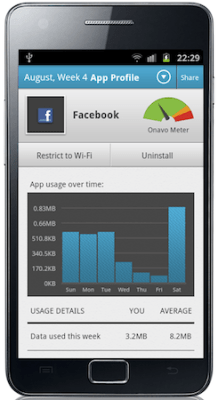Onavo, makers of the money-saving, data-compressing app mobile app, just raised $10 million in Series B funding. Horizons Ventures, the private investment arm of Li Ka-shing, led the investment along with Motorola Mobility Ventures, the strategic equity investment arm of Motorola Mobility, Inc.
The company’s previous investors, Sequoia Capital and Magma Venture Partners, also participated in the round.
As a part of the new funding, Jason Wong from Horizons Ventures joined Onavo’s board of directors.
Onavo, for those unaware, is a cross-platform mobile application which runs in the background, monitoring the data usage on your mobile device. When you use your phone’s data connection, the app steps in to route the data in a compressed format through its own cloud servers, before the data reaches the carrier. (Yep, it’s basically a proxy server.)
The app makes sense for price-conscious consumers, who can’t afford high dollar mobile data plans. It’s also helpful for travelers, who need access to data while overseas, but can’t afford the astronomical bill that accompanies such usage.
On iOS, the app actually compresses the data (the company claims up to 80%), but, in a weird turn of events, it’s actually the Android version that’s less powerful. For now, the Android app only warns users of data hogging apps, providing increased visibility into the apps and services running on the mobile user’s handset. It doesn’t actually compress data.
Although some consumers may see such an app as a way to thumb their nose at carriers’ and their high mobile data prices, the truth is that carriers, too, are facing the increased burden of users’ growing desire for more and more mobile data. They’re not as opposed to a data-saving app like this as you may think.
Says Jason Wong of Horizons Ventures, “mobile data use continues to grow exponentially, which creates issues for carriers and consumers alike…We believe Onavo’s unique data compression solution will prove compelling to both carriers and consumers.”
